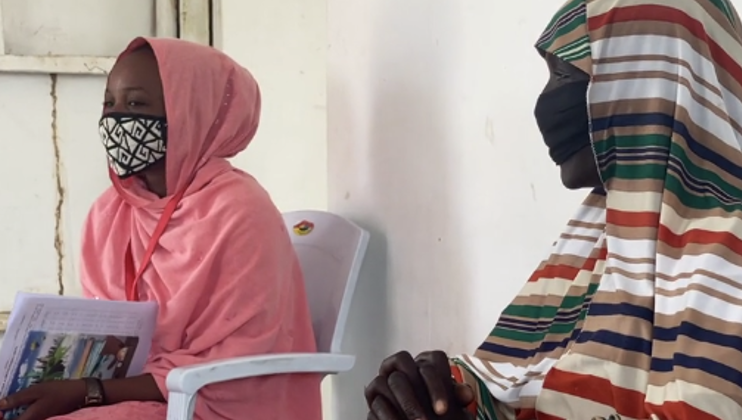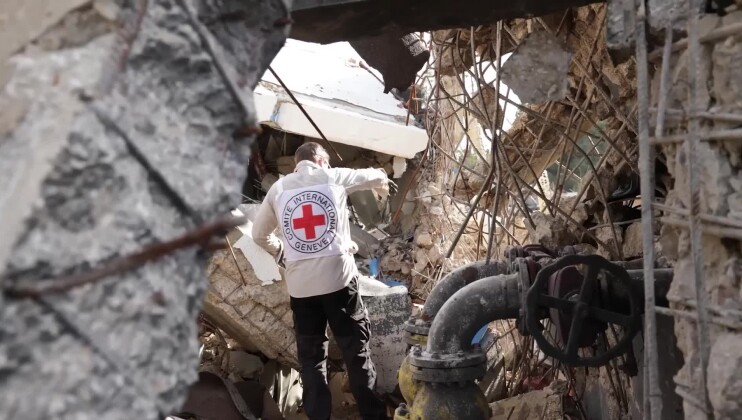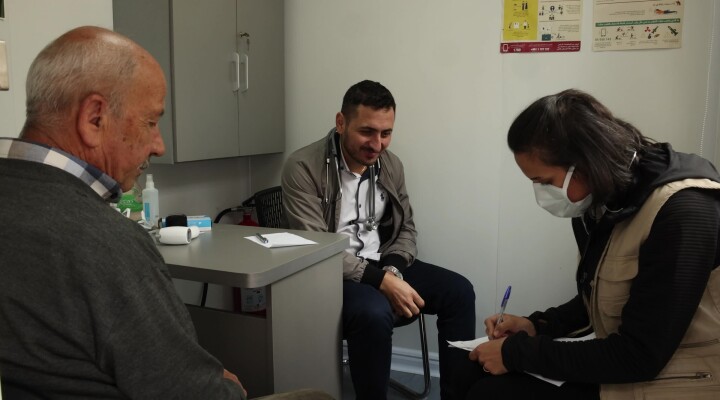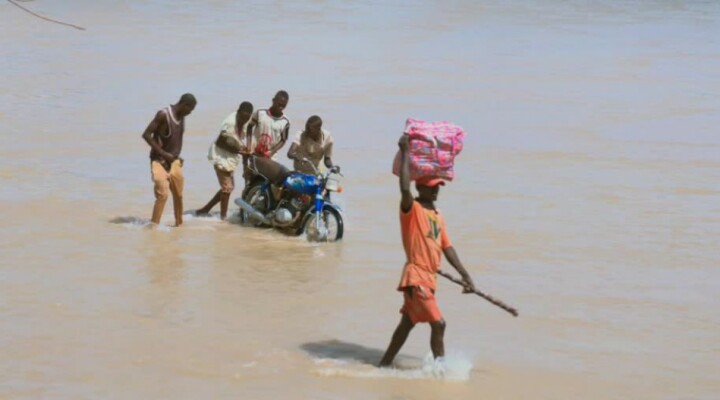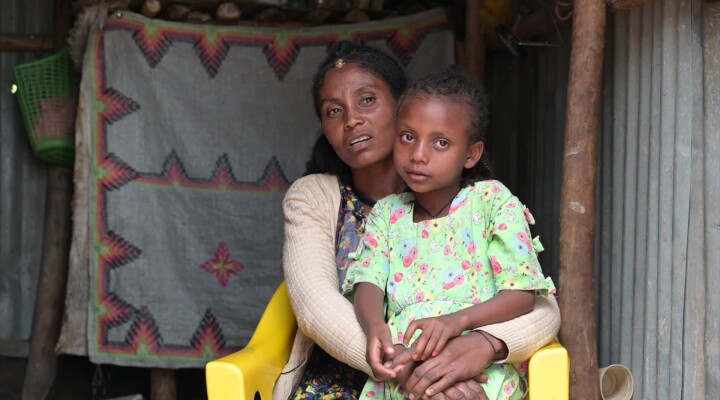New Red Cross survey shows COVID-19 affecting mental health of one in two people
Half of all respondents -- 51 percent -- in a seven-country survey said that the COVID-19 pandemic has negatively affected their mental health, an International Committee of the Red Cross (ICRC) survey found.
“More than one in five people living in a conflict zone have some kind of mental health condition. That’s three times more than in the general global population,” said Robert Mardini, the ICRC’s director-general. “For thousands of people affected by armed conflict, the pandemic has exacerbated their psychological distress. On top of concerns about health and wellness, the combined effects of lockdown restrictions, the absence of social interactions, social outlets, and the aggravation of economic challenges are further impacting mental health and access to care.”
Covid-19 has created a crisis that touches everyone but pandemic pressures are amplified in a war zone, where you are no longer able to work, water is scarce, hospitals have been bombed or are overwhelmed with casualties, or you may be forced to flee to an overcrowded displacement camp – and all without reliable public health information.
For some the isolation and lockdown restrictions have brought back terrifying memories of war. As Nazha Motee’ El Hallaq, a Syrian refugee speaking from her hairdressing salon in Aarsal, Lebanon explains, “When self-isolation started taking place and we found ourselves in the house not being able to move around, it reminded me of a time when we were in Syria and we had to stay home because of the shelling and bombing.”
Gazans feel acutely vulnerable. They fear for their own safety and that of their loved ones, while living with the knowledge that services they depend upon – such as electricity – can be cut at any time. The consequences on the mental health of a population that has lived under severe movement and trade restrictions for 14 years should not be underestimated.
The ongoing economic and food security impact of COVID-19 is massive and appears likely to worsen over time. Struggling breadwinners and caregivers can be forced to choose between going hungry and exposing themselves to COVID-19 to make ends meet – all with the constant menace of conflict and violence. As mother of nine, Fatima Maina, a widow living in Borno state in North East Nigeria, explains: “There is no food, no water. Me and my children are suffering. They were sent home from school. My children lost their father and they are nine. I am suffering.”
In Donetsk, Ukraine the ICRC has been distributing food parcels and hygiene kits, but pensioner Tamara worries about how long these supplies will last: “Our pensions are not enough. These boxes will help us to survive for a while. We don’t sleep at night. We have become stressed. Our blood pressure goes up with all this fear.”
The situation is particularly difficult for some of Lebanon’s most vulnerable groups, including the 1.5 million population of Syrian refugees, following the explosion in Beirut in August. As Christelle Madani, an ICRC psychologist, explained, “the Lebanese population was already drained economically and psychologically on top of the COVID-19 pandemic, so this huge blast has shaken the remaining sense of safety to the core as they were hit in their own homes.”
Nearly three in four respondents to the ICRC survey – 73 percent – said that frontline health workers and responders have more need for mental health support than the average person. The hardship associated with their roles aggravates their own individual and social concerns and needs. They need access to support and care to ensure they can continue to care appropriately for others. “We'd see horrible things. But we were also hoping to do our best for the patient” said Dr Sérgio Simões, working in a hospital in Fortalez in Brazil. “Everyone has been impacted psychologically. I have a number of colleagues who sought treatment with a psychologist or even a psychiatrist. I was suffering from anxiety and I had to see the psychiatrist to increase my dose of medication because it was really difficult for us.”
The ICRC has continued to offer and support Mental Health and Psychosocial (MHPSS) services in conflict zones throughout the COVID-19 pandemic. Joy Adams, an ICRC psychologist, runs psychological support programs in camps for displaced people who have fled fighting in North East Nigeria. “So many of them struggled. They spent days, weeks, and months before they are able to arrive at some place that looks like safety,” she said. But a core component of the programs is based on people coming together and talking in groups. “It really set us back,” she said. “A lot of people are not sure if it is ok to come back to together with people. And the group sizes have been reduced from 12 to five to allow for social distancing.”
The Red Cross and Red Crescent Movement recommendations for states, policy makers, mental health and psychosocial support advocates and practitioners include:
· Ensuring early and sustained access to mental health and psychosocial support services for people affected by the pandemic
· Integrating mental health and psychosocial support in all responses addressing the needs arising because of the pandemic
· Prioritising the protection of the mental health and wellbeing of staff and volunteers responding to the humanitarian needs in the pandemic
Notes to editors:
On the ICRC survey: A total of 3,500 people responded to the ICRC-commissioned survey from seven countries: Colombia, Lebanon, the Philippines, South Africa, Switzerland, Ukraine and the United Kingdom. The survey, which was carried out by Ipsos from September 18-22, queried 500 people per country from a nationally representative sample. Individual country results are available upon request.
For further information, please contact:
Aurélie Lachant, International Committee of the Red Cross (ICRC)
Geneva: +41 79 244 64 05, alachant@icrc.org
LOGLIST
Location: Various
Camera: Various
Producer / Editor: Christopher Nicholas
Date of filming: 2020
Length: 07:14
On-screen credit: ICRC
ICRC ref: 20201006-MentalHealth
Copyright: ICRC
00:00 Women from the Stadium IDP camp attending the Mental Health and Psychosocial program run by the ICRC and Nigerian Red Cross, September 2020
00:45 Soundbite Joy Adams, ICRC Psychologist, September 2020
“So many of them struggled. They spent days, weeks, and months, before they are able to arrive at some place that looks like safety.
One of the things we do in groups is to allow people to share experiences about what they have been through, and maybe a particular symptom they are having. So for instance, let’s say we are talking about flashbacks. We allow people to share experiences on what they think, on how this affects them, their functionality, in their families, in their homes, with their children and work.
It (COVID-19) really set us back. A lot of people are not sure if it is ok to come back to together with people. And even though we are trying to bring back activities, it is going to reduce the number of people we bring together. And a lot of people are very skeptical to come back; they are not sure if it is ok to come back with people. Everybody is uncertain and are like “I don’t trust you…I don’t know if you have COVID” So it is still very challenging. The last three weeks we have been trying to reach out to our beneficiaries, some of them we don’t even know where they are. It has been three months since we saw them. And from the twelve we had, we had to reduce to like five or six, to enable us to do social distancing.”
02:22 Soundbite Robert Mardini, Director General, ICRC, Geneva, September 2020
“More than one in five people living in a conflict zone have some kind of mental health condition. That’s three times more than in the general global population,” said Robert Mardini, the ICRC’s director-general. “For thousands of people affected by armed conflict, the pandemic has exacerbated their psychological distress. On top of concerns about health and wellness, the combined effects of lockdown restrictions, the absence of social interactions, social outlets, and the aggravation economic challenges are further impacting mental health and access to care.”
02:59 Nazha Motee’ El Hallaq, a Syrian Refugee who received support from the ICRC and British Red Cross, in her hairdressing salon, Aarsal, Lebanon, May 2020.
03:21 Soundbite Nazha Motee’ El Hallaq, May 2020
“When self-isolation started taking place and we found ourselves in the house not being able to move around, it reminded me of a time when we were in Syria and we had to stay home because of the shelling and bombing.”
03:31 Streets of Gaza during the lockdown, August 2020
03:55 Nigerian farming communities receiving seeds and cash, Maiduguri, Borno State, Nigeria, May 2020
04:34 Soundbite Fatima Maina, a widow living in Borno state in North East Nigeria
“There is no food, no water, me and my children are suffering. They were sent home from school. My children lost their father and they are nine. I am suffering.”
4:47 Distribution of food and hygiene kits to the community in Donetsk, Ukraine, March 2020
05:04 Soundbite from pensioner, Tamara from Donetsk, Ukraine
“Our pensions are not enough. These boxes will help us to survive for a while. We don’t sleep at night. We have become stressed. Our blood pressure goes up with all this fear.”
05:31 People in Beirut clearing the streets in the aftermath of the explosion, August 2020
06:09 Soundbite Christelle Madani, ICRC Psychologist, Beirut, August 2020
“The Lebanese population was already drained economically and psychologically on top of the COVID-19 pandemic, so this huge blast has shaken the remaining sense of safety to the core as they were hit in their own homes.”
06:22 Destroyed buildings in Beirut, August 2020
06:38 Doctor Sérgio Simões at Yolanda Queiroz Emergency Care Facility in Fortaleza, Brazil, August 2020
06:47 Soundbite Doctor Sérgio Simões, August 2020
“Everyone has been impacted psychologically. I have a number of colleagues who sought treatment with a psychologist or even a psychiatrist. I was suffering from anxiety and I had to see the psychiatrist to increase my dose of medication because it was really difficult for us.”
07:02 Doctor Sérgio Simões examining a patient, August 2020
07:14 ENDS
